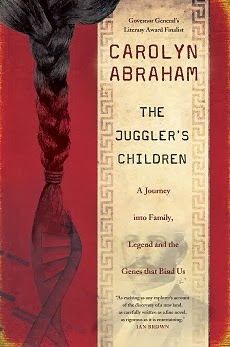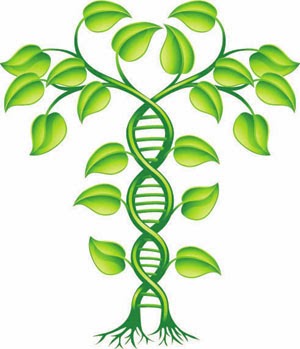Genetic Genealogy

The Lambton County Archives recently held a presentation on genetic genealogy where presenter Carolyn Abraham explained the science behind using DNA testing to reveal secrets in your family ancestry. Carolyn is a former medical science reporter for the Globe and Mail and author whose recent non-fiction book The Juggler's Children: A Journey into Family, Legend and the Genes that Bind Us has been shortlisted for the Governor General's award for 2013. (If you are interested in obtaining a copy, please contact The Book Keeper.)
Carolyn explained during her presentation that this book chronicles her personal experience with genetic genealogy as well as the how-to's and potential issues involved in this avenue of genealogy. There were always family mysteries surrounding both of Carolyn's great-grandfathers and the birth of her daughter around the time of the human genome project spurred her to research her ancestry.
Types of DNA Tests
As Carolyn explained, the "genome is a portal to the past" in that it can reveal where in the world our ancestors came from and how we are related to others. There are three basic DNA tests which all require a cheek swab:
- Mitochondrial DNA Test: since mtDNA is passed from mother to children, this form of testing is limited by the fact that only women pass this DNA on. mtDNA does not change quickly from one generation to the next, so it is a powerful tool to reveal if people had a common female ancestor. This is limited since it can only reveal the commonality, and not when that commonality occurred (i.e. could be five years ago or 500 years ago.)
- Genome Scan Test: scans chromosomes from mother and father to provide a breakdown of ethnic percentages and ability to connect with relatives within approximately the last 5 generations.
- Y-DNA Test: available for males only since the Y chromosome passes from father to son, this test can reveal ancestral paternal lines and allow you to connect with genetic cousins and also reveal your haplogroup (which area of the world your ancestors came from.)
Possible Ethical Issues
When you are testing something as personal as DNA, it is important to be aware of possible ethical concerns right from the beginning. There is always the potential to find that a relative you may be testing is not genetically related (i.e. father is not the biological father.) This issue is so common that software has been designed to catch these "false paternities" which has been estimated to account for about 10% of tests.
It's your obligation to give people the full information and potential results before they agree to contribute to your research. This not only impacts them, but their children and the wider family. DNA testing always has the potential to open up closed doors, so you should establish who you will be sharing information with at the beginning of your research.

Presenter Carolyn Abraham.
Recommendations for Further Information
Carolyn recommends the company Family Tree DNA and suggests that those seeking more genetic genealogy information check the website of the International Society of Genetic Genealogy. This non-profit group promotes the use of genetic testing in genealogy, and has many free resources and links on their website.
Conclusion
Testing for DNA can help reveal secrets in family trees and fill in the blanks where paper records do not exist. It is a powerful tool to supplement traditional archival research. As always, the staff at the Lambton County Archives are here to help you with this research and we are also interested to hear your stories of genetic genealogy usage.

DNA testing can reveal results which affect the entire family.
The above blog post was written by guest blogger Archivist Heather Lavallee.

 Subscribe to this page
Subscribe to this page